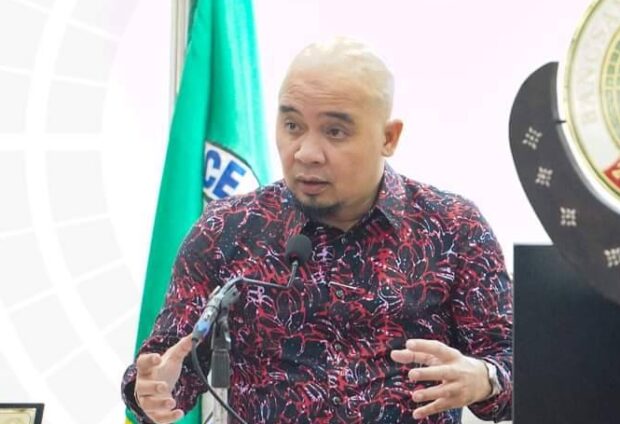
Omar Yasser Sema —PHOTO COURTESY OF BANGSAMORO TRANSITION AUTHORITY
COTABATO CITY—The Bangsamoro parliament has expressed its support for Charter change (Cha-cha) in order to address constitutional issues hindering the full implementation of the Bangsamoro peace agreement.
In a resolution passed on Wednesday, copies of which were sent to the Office of the President, the Senate President and the Speaker of the House of Representatives, the Bangsamoro parliament noted that the previous Bangsamoro Transition Commission (BTC), the body tasked to draft the regional government’s charter, was also mandated to propose constitutional amendments to accommodate contentious provisions in the peace agreement that could not be served under the 1987 Constitution.
Among the key issues highlighted as requiring constitutional amendment were that on power sharing between the national and regional governments, institutionalization of the Sharia justice system, policing in the Bangsamoro region, supervision and control of the regional government over its constituent local government units and the qualifications of the Chief Minister who is the region’s chief executive.
“The current move for charter change offers a golden opportunity for the Bangsamoro people to again put forward the issues in the peace agreement that need constitutional amendment,” said part of the resolution unanimously passed by 41 Bangsamoro Transition Authority members present during Wednesday’s session.
Self-determination
The Bangsamoro Autonomous Region in Muslim Mindanao (BARMM) is a product of a peace accord designed to correct historical injustices and fulfill the aspirations of the Bangsamoro people for self-determination.
Since the signing of the Comprehensive Agreement of the Bangsamoro between the government and the Moro Islamic Liberation Front (MILF) in 2014 and the enactment of the Bangsamoro Organic Law (BOL), these provisions in the peace accord remained unimplemented due to constitutional issues.
“Amending the 1987 Constitution to accommodate the necessary provisions for the full implementation of the peace agreement is a prudent and responsible action, ensuring that the Bangsamoro people are afforded the rights, autonomy and resources they are entitled to under the peace accord,” said Bangsamoro Parliament Speaker Pangalian Balindong.
While some proponents of Charter change wanted to limit the amendments to key economic provisions, the Bangsamoro Parliament suggested incorporating amendments related to peace provisions. This is aimed at accommodating the “asymmetrical relationship” between the national government and the Bangsamoro.
“I would like to see the barest minimum expanded powers of the regional government in the BOL reflected in the new constitutional franchise. Such inclusion will ensure the continuity of our plans and programs to achieve genuine peace and development for our people and homeland,” Balindong added.
Assurance of permanence
He also stressed the urgent need to institutionalize the current form of the Bangsamoro government within the proposed constitutional revision.
“As Bangsamoros, we are as equally invested as our fellow Filipinos in actively participating in the discussion of constitutional reforms,” he said.
Deputy Speaker Omar Yasser Sema, a second generation member of the Moro National Liberation Front (MNLF), earlier lamented that the current discussions about Charter change by national leaders had never factored in the perspective of the Bangsamoro people.
Sema explained that entrenching the letter and spirit of the peace accord into a revised constitution of the country would give the Bangsamoro people an assurance of permanence.
It will also put an end to constant legal challenges against legislative acts of the Bangsamoro Parliament, Sema added, noting that the Bangsamoro Electoral Code and the Bangsamoro Local Governance Code are undergoing constitutional questions before the Supreme Court.
Even the BOL is being questioned before the high court for supposed constitutional infirmities.
When a peace deal was still being negotiated back in 2011, the government’s chief negotiator then, now Associate Justice Marvic Leonen, assured the MILF that some of its political demands could be accommodated within the flexibilities of the Constitution.
Many key leaders of MNLF and MILF have always been part of movements to push for redrawing the country’s system of political administration as an opportunity to advance their common goal of Bangsamoro self-governance.